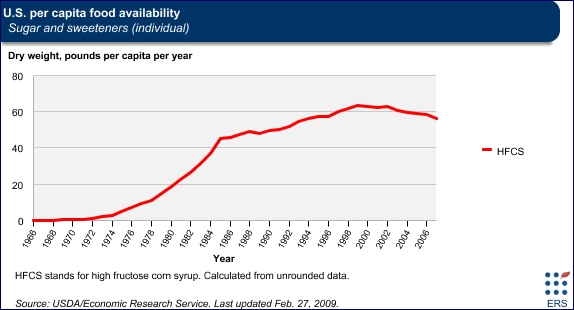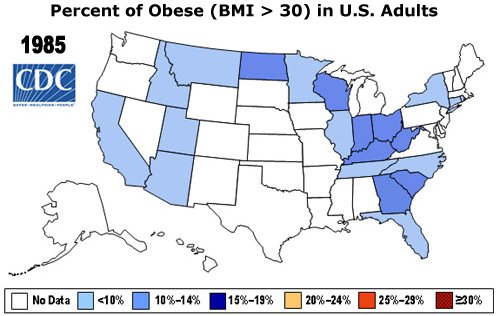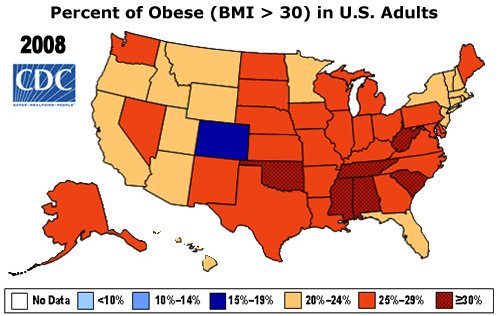Charles Hugh Smith discusses the somewhat arbitrary new tax on soda in Berkeley, California. There are several issues with taxing "unhealthy" substances. (1) Are the proceeds earmarked to go towards health care? (I don't know.) (2) More problematically: Do we really know what's healthy and what's not? Cigarettes are an easy case. So is soda. But what about more complicated foods which have pluses and minuses, for example chocolate? What about tea (healthy); tea with sugar? (I don't know). Tax the sugar?
What about the food industry's habit of being wrong about major food groups — butter, for example. At one time, the food industry replaced butter with a less healthy alternative – margarine ladened with transfats. Had I been taxed for the past 30 years on butter, could I get a refund? What about foods whose place in a healthy diet is controversial (red meat, eggs, milk, carbohydrates, soy)? Should we just tax everything that isn't organically grown broccoli?
Or just tax me if I get fat – set my ideal weight and if I exceed it by 10% or more, assume I'm wrongfully indulging in something. And tax it. ~ Ilene

Courtesy of Charles Hugh-Smith of OfTwoMinds blog
A recent revenue-enhancement fad in local government is to levy a tax on soft drinks. The tax is marketed to voters as a means of reducing soda consumption, which is presumed to be a contributor to the explosive rise in Type II diabetes, and more broadly, metabolic syndrome or diabesity.
While the intake of sugar/high fructose and sweetened beverages is certainly detrimental to health (see links below), it seems taxing sodas is more a topical excuse for skimming a new revenue stream than a meaningful way to reduce obesity/diabesity.
I have covered America's declining health and fitness and the dramatic impact of high-sugar diets for many years:
Please view this documentary on the science of sugar consumption:
So here's the obvious question for proponents of sugary sodas: why tax only sodas? If sugar is the addictive culprit, then why not tax everything that has sugar as an ingredient?
That list would include most of what many Americans consume on a daily basis:
— sweetened coffee drinks
— sweetened ice teas
— sweetened "sports drinks"
— doughnuts, pastries, cakes, pies, etc.
— milk shakes
— sweetened salad dressings
ice cream, frozen yogurt, whipped cream, etc.
— sweetened cold cereals
— sweetened yogurts
— sweetened fruit cups, canned fruits, etc.
— sweetened breads, rolls, rice puddings, etc.
This is just a partial listing; the full list of foods containing sugar or equivalents includes a vast array of packaged and fast foods–the mainstays of the typical convenience-based derealized American diet.
Here is a chart showing the extraordinary rise in consumption of high-fructose corn syrup in the U.S.:
The impact of empty sugar calories and the addictive qualities of sugar can be seen in these maps of obesity prevalence by state, from 1985 to 2008. Note how the maps track the rise in HFCS:
Clearly, obesity has exploded into a pandemic in just a single generation, and the correlation to the astounding increase in sugar consumption is self-evident.
But hey, local governments: why stop at sugar? How about taxing red meat, refined carbohydrates and all the other bad things we consume? The negative impact of a diet heavy with factory-raised red meat and heavily refined carbohydrates is well-documented; why pick on soda, when virtually everything in the packaged-food/fast-food diet is also detrimental to health?
And why stop at taxing unhealthy food? Why not tax unhealthy lifestyles? Those who don't eat their broccoli and aren't fit should be taxed; after all, it isn't just eating too much sugar that's the problem; it's lack of exercise that burns off those empty calories.
The absurdity of taxing us to health is obvious – as is the unlimited greed and avarice of local government for more tax revenues, by any means available. Eat sugar, go to jail. The local Gulag would love it.








